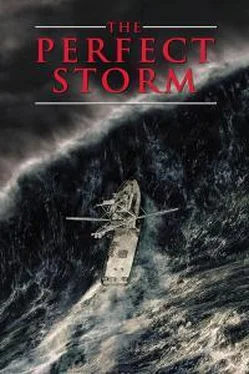Sebastian Junger - The Perfect Storm
Здесь есть возможность читать онлайн «Sebastian Junger - The Perfect Storm» — ознакомительный отрывок электронной книги совершенно бесплатно, а после прочтения отрывка купить полную версию. В некоторых случаях можно слушать аудио, скачать через торрент в формате fb2 и присутствует краткое содержание. Жанр: Триллер, Проза. Описание произведения, (предисловие) а так же отзывы посетителей доступны на портале библиотеки ЛибКат.
- Название:The Perfect Storm
- Автор:
- Жанр:
- Год:неизвестен
- ISBN:нет данных
- Рейтинг книги:3 / 5. Голосов: 1
-
Избранное:Добавить в избранное
- Отзывы:
-
Ваша оценка:
- 60
- 1
- 2
- 3
- 4
- 5
The Perfect Storm: краткое содержание, описание и аннотация
Предлагаем к чтению аннотацию, описание, краткое содержание или предисловие (зависит от того, что написал сам автор книги «The Perfect Storm»). Если вы не нашли необходимую информацию о книге — напишите в комментариях, мы постараемся отыскать её.
The Perfect Storm — читать онлайн ознакомительный отрывок
Ниже представлен текст книги, разбитый по страницам. Система сохранения места последней прочитанной страницы, позволяет с удобством читать онлайн бесплатно книгу «The Perfect Storm», без необходимости каждый раз заново искать на чём Вы остановились. Поставьте закладку, и сможете в любой момент перейти на страницу, на которой закончили чтение.
Интервал:
Закладка:
Moore swims hard for several minutes and finally looks up at Vriesman, shaking his head. The boat's under power and there's no way he's going to catch her, not in these seas. Vriesman sends the basket down and Moore climbs back in. Just as he's about to ride up, the wave hits.
It's huge and cresting, fifty or sixty feet. It avalanches over Moore and buries both him and the lift basket. Vriesman counts to ten before Moore finally pops up through the foam, still inside the basket. It's no longer attached to the hoist cable, though; it's been wrenched off the hook and is just floating free. Moore has such tunnel vision that he doesn't realize the basket has come off; he just sits there, waiting to be hoisted. Finally he understands that he's not going anywhere, and swims the basket over to the cable and clips it on. He climbs inside, and Vriesman hauls him up.
This time they're going to do things differently. Hessel banks the helicopter to within fifty feet of the Satori and shows a chalkboard that says, "Channel 16." Bylander disappears below, and when Hessel has her on the VHF, he tells her they're going to do an in-the-water pickup. They're to get into their survival suits, tie the tiller down, and then jump off the boat. Once they're in the water they are to stay in a group and wait for Moore to swim over to them. He'll put them into the hoist basket and send them up one at a time.
Bylander climbs back up on deck and gives the instructions to the rest of the crew. Moore, looking through a pair of binoculars, watches them pull on their suits and try to will themselves over the gunwale. First, one of them puts a leg over the rail, then another does, and finally all three of them splash into the water. It takes four or five minutes for them to work up the nerve. Leonard has a bag in one hand, and as he goes over he loses his grip and leaves it on deck. It's full of his personal belongings. He claws his way down the length of the hull and finally punches himself in the head when he realizes he's lost it for good. Moore takes this in, wondering if Leonard is going to be a problem in the water.
Moore sheds his hood and gloves because the waters so warm and pulls his mask back down over his face. This is it; if they can't do it now, they can't do it at all. Hessel puts the Satori at his six o'clock by lining them up in a little rearview mirror and comes down into a low hover. It's delicate flying. He finally gives Moore the go-ahead, and Moore breathes in deep and pushes off. "They dropped Moore and he just skimmed over the top of the water, flying towards us," says Stimpson. "When he gets there he says, 'Hi, I'm Dave Moore your rescue swimmer, how are you?' And Sue says, 'Fine, how are you?' It was very cordial. Then he asks who's going first, and Sue says, 'I will.' And he grabbed her by the back of the survival suit and skimmed back across the water."
Moore loads Bylander into the rescue basket, and twenty seconds later she's in the helicopter. Jump to recovery takes five minutes (avionicsman Ayres is writing everything down in the hoist log). The next recovery, Stimpson's, takes two minutes, and Leonard's takes three. Leonard is so despondent that he's deadweight in the water, Moore has to wrestle him into the basket and push his legs in after him. Moore's the last one up, stepping back into the aircraft at 2:29. They've been on-scene barely two hours.*
Moore starts stripping off his gear, and he's got his wetsuit halfway off when he realizes the helicopter isn't going anywhere. It's hovering off the Tamaroa's port quarter. He puts his flight helmet on and hears the Tamaroa talking to Hessel, telling him to stand by because their Avon crew still needs to be recovered. Oh, Jesus, he thinks. Moore pulls his gear back on
* Ray Leonard was unavailable for interviews with the media after the storm, and he was unavailable to this author two years later. However, since the publication of the hardcover edition, he has denied the acuracy of this account of the Satori's voyage. Primarily, he maintains that he and his crew were never in danger during the storm, and that they should not have been forced off the boat by the Coast Guard. In support of this, he cites his own long experience as a sailor, the extremely heavy construction of the boat, and the fact that the boat survived the storm intact and was eventually salvaged off the New Jersey coast. He says that "lying ahull"—that is, battering down the hatches and staying safely in the bunks—wasn't evidence of passivity on his part, but was rather an accepted heavy-weather strategy. In contradiction to crew member Karen Stimpson's recollection, Leonard insists that he took an active role in the handling of the boat, and that he did not take a drink of alcohol until after the Coast Guard arrived. He was ordered off the boat, he maintains, because his two crew members were inexperienced and terrified.
and takes up his position at the jump door. Hessel has decided on another in-the-water rescue, and Moore watches the three Coast Guardsmen grab hands and reluctantly abandon ship. Even from a distance they look nervous. Hessel comes in low and puts them at his six o'clock again, barely able to find such a small target in his rearview mirror. Moore gets the nod and jumps for the third time; he's got the drill down now and the entire rescue takes ten minutes. Each Coast Guardsman that makes it into the aircraft gives Stimpson a thumbs-up. Moore comes up last—"via bare hook," as the report reads—and Vriesman pulls him in through the door. The H-3 banks, drops her nose, and starts for home.
"When I got up into the helicopter I remember everyone looking in my and Sue's faces to make sure we were okay," says Stimpson. "I remember the intensity, it really struck me. These guys were so pumped up, but they were also human— real humanity. They'd take us by the shoulders and look us in the eyes and say, 'I'm so glad you're alive, we were
with you last night, we prayed for you. We were worried about you.' When you're on the rescuing side you're very aware of life and death, and when you're on the rescued side, you just have a sort of numb awareness. At some point I stopped seeing the risk clearly, and it just became an amalgam of experience and observation."
Stimpson has been awake for forty-eight hours now, much of it above deck. She's starting to get delirious. She slumps into a web seat in the back of the helicopter and looks out at the ocean that almost swallowed her up. "I saw the most amazing things; I saw Egypt and I knew it was Egypt," she says. "And I saw these clay animals, they were over green pastures like the Garden of Eden. I could see these clay animals and also gorgeous live animals munching on grass. And I kept seeing cities that I recognized as being from the Middle East."
While Stimpson drifts in and out of hallucinations, the H-3 pounds home through a seventy-knot headwind. It takes an hour and forty minutes to get back to base. Three miles off Martha's Vineyard the crew look down and see another Coast Guard helicopter settling onto a desolate scrap of land called Noman's Island. A Florida longliner named the Michelle Lane had run aground with a load of swordfish, and her crew had spent the night under an overturned life raft on the beach. An H-3 was dispatched from Air Station Cape Cod to take them off, and Hessel happens to fly by as they're landing.
Hessel touches down at 4:40 at Air Station Cape Cod, and the other H-3 comes in a few minutes later. (While landing at Noman's, as it turned out, the rotor wash flipped the raft over and knocked one of the fishermen unconscious. He was taken off in a Stokes litter.) It's almost dark; rain flashes down diagonally through the airfield floodlights and scrub pine stretches away darkly for miles in every direction. The six survivors are ushered past the television cameras and led into changing rooms upstairs. Stimpson and Bylander pull off their survival suits, and Bylander curls up on a couch while Stimpson goes back downstairs. The simple fact of being alive has her so wired she can hardly sit still. The Coast Guardsmen are gathered with the reporters in a small television room, and Stimpson wanders in and finds Leonard sitting miserably on the floor, back to the wall. He's not saying a word.
Читать дальшеИнтервал:
Закладка:
Похожие книги на «The Perfect Storm»
Представляем Вашему вниманию похожие книги на «The Perfect Storm» списком для выбора. Мы отобрали схожую по названию и смыслу литературу в надежде предоставить читателям больше вариантов отыскать новые, интересные, ещё непрочитанные произведения.
Обсуждение, отзывы о книге «The Perfect Storm» и просто собственные мнения читателей. Оставьте ваши комментарии, напишите, что Вы думаете о произведении, его смысле или главных героях. Укажите что конкретно понравилось, а что нет, и почему Вы так считаете.












